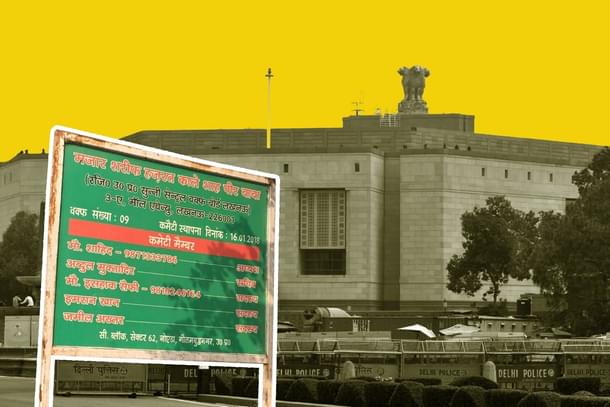Politics
Amendments Are The Ideal Way Forward, Repealing Waqf Act Will Take Us Back To Square One
Ananth Krishna
Nov 28, 2024, 03:26 PM | Updated Nov 29, 2024, 03:41 PM IST
Save & read from anywhere!
Bookmark stories for easy access on any device or the Swarajya app.


The idea to repeal the Waqf Act is short-sighted and absurd. It will lead to a regulatory vacuum and even more pernicious results.
Ever since the Waqf Amendment, 2024 was introduced, there has been a spectrum of responses to the proposal. While the opposition reacted in a predictable manner, there has been some suggestion that the Waqf Act be repealed instead of the amendments that the NDA Government has advanced.
The idea that the Waqf Act should be repealed is, however, shortsighted, legally dubious, and likely to have the opposite effect of what its proponents desire. This is simply due to a misunderstanding of what Waqfs are and the constitutional framework regulating religious and charitable endowments.
Repealing Waqfs Will Let INDI States Regulate Waqf
Post Independence, the Constitution also gave the power to states to continue regulating religious and charitable endowments. Entry 28 of List -III (Concurrent list) enables both the centre and the states to regulate “Charities and charitable institutions, charitable and religious endowments and religious institutions.” It was under this provision that many states regulated Waqfs separately until the 1995 Act came into force. Once the Centre enacts a law on a given subject, any conflicting state law is overridden to the extent of the central law, as per Article 254.
All of this in essence means that a proposal to repeal Waqfs will only allow states to enact legislation governing Waqfs. The end result could very well be that an NDA Government repealing Waqfs will enable INDI Governments across the state to create even more pernicious legislation than the current 1995 Waqf Act
Regulating Waqfs As Public Trusts: Imperfect And Problematic
The first fact that most fail to comprehend is that Waqfs are not public trusts. They are not property dedicated by persons to the public good or benefit, rather they are dedicated to Allah or for purposes recognised under Islamic Law as “pious, religious or charitable.” There can be an overlap between this and what we consider a ‘public trust,’ but they cannot be regulated effectively under the same premise. Similarly, the powers of a mutawalli cannot be compared to that of a trustee, whose powers are more wide-ranging.
The British had provided for a generic law to regulate Waqfs under the Religious Endowments Act, 1863, and the Charitable Endowments Act, 1890 (both still in force). However, this was an imperfect solution as it treated both mosques and temples in the same manner, resulting in real-life implementation problems, particularly in the regulation of Hindu and Muslim religious endowments.
This led to the enactment of different laws to regulate these endowments and institutions. It should also be noted that the provincial governments that came to power after the Government of India Act, 1935 created separate legislations to govern Waqfs. The only province to not enact a sui generis (unique) law was Bombay, but even then, they had a specific provision to exclude family Waqfs (waqf-alal-aulad) from any form of regulation.
The Waqf Amendments Are The Best Solution
Suppose the government does repeal the Waqf Act, what happens to the Waqf properties? They would revert to the earlier mentioned colonial legislations. This would, however, remove any form of direct oversight on Waqf properties and claims made thereof, creating a regulatory vacuum, which would lead to a worse outcome.
The advocates of repealing the Waqf Act are also overlooking the fact that the pernicious provisions in the Act have already been repealed. If the teeth that have made the Waqf Act so fearsome and arbitrary have been removed, and replaced with a superior system that respects the process of the legal system, then there are no real grounds to argue that Waqfs should not be regulated.
Another fact to note is that Hindu Religious Endowments and Institutions too are regulated under various state legislations, failing which the colonial legislations fill the void. An ordinary Hindu can, and often does, will property in the name of religion or religious institutions, subject to the relevant legislations. The issues surrounding the regulation of Hindu religious and charitable endowments have, of course, been a matter of public debate for a significant period of time, with the problems and solutions differing for obvious reasons.
Another important point to note is that, given the design of the Waqf Amendment, the level of regulation and oversight on Waqf properties would be much greater than that of any other form of trust or endowment.
To sum up, those advocating for the repeal of the Waqf Act are not only thwarting an exemplary effort by the Modi government in the form of the amendment but are unknowingly (or knowingly) advocating for opposition-ruled states to replicate the current act in its pernicious form, or perhaps even go further.
The author would like to thank Neeti Vaani and Monalisa Nanda for their inputs.
Ananth Krishna is a lawyer and observer of Kerala's politics.





